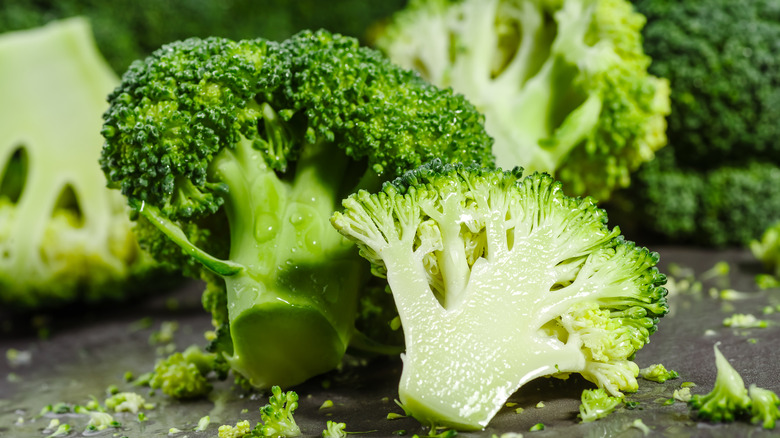You Should Avoid Broccoli If You're Taking This Medication
Broccoli generally is a delicious and incredibly healthy vegetable and food choice. While it has long been enjoyed by many worldwide, it can actually be dangerous to some people.
Broccoli is a cruciferous vegetable known for its many health benefits (per Healthline). It's high in many nutrients with a nutritional breakdown that is highly beneficial. Broccoli contains fiber and small amounts of protein. The fiber content can aid gut health and weight loss and help reduce the risk of some diseases. The low sugar content and fiber in broccoli can also help reduce blood sugar rather than spike it.
The nutrients in broccoli include vitamin C, iron, vitamin K, potassium, folate, and manganese, among many others the body needs and uses. Broccoli also contains powerful antioxidants and plant compounds that help fight cell damage, reduce inflammation, lower blood pressure and protect against heart disease and cancer. With a nutritional profile like this, it's no wonder broccoli is a staple of many diets. Unfortunately, its high vitamin K content can cause problems for some that could be unexpectedly dangerous.
Vitamin K interacts with warfarin
Blood can clot or change shape and form a plug made from tiny platelets (via WebMD). This process can be beneficial when appropriately triggered and used to stop the body from bleeding. However, improper blood flow or blood coming into contact with cholesterol can cause harmful blood clots to form that can cause heart attacks, strokes, atrial fibrillation, and deep vein thrombosis. In response, anticoagulants, which slow down clotting, are prescribed to manage this type of clot.
Warfarin is an anticoagulant taken every day to help control how fast the blood clots form (per Cleveland Clinic). It can help prevent a clot from growing and traveling to the heart, lungs, and brain. In contrast, vitamin K plays a significant role in blood clotting, and without it, the body cannot produce one of the factors necessary for clots (via Medical News Today). Vitamin K is obtained through food; hence, if the amount consumed is high enough, it can interfere with the effects of warfarin.
Broccoli's high vitamin K content is a cause for concern, as it is such a widely known vegetable (per Healthline). Vitamin K's clotting benefits will work against prescribed warfarin, making it less effective (per Medical News Today). Without warfarin working effectively for some people, clots may form or worsen, leading to disastrous results. Since broccoli is a food eaten for health benefits, including heart health, it could be easy to consume too much and inadvertently put your health at further risk.


